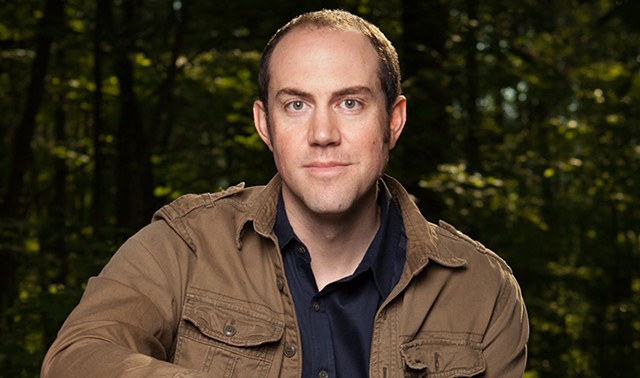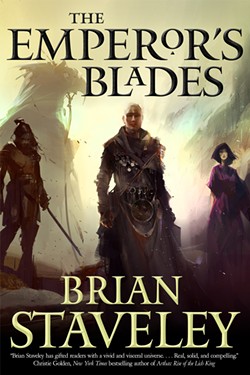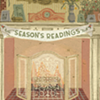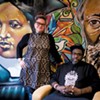click to enlarge 
- courtesy of Bian Staveley
Tales of dragons and wizard duels weren't always cool. While fantasy fiction has long had its niche audience, Vermont author Brian Staveley says that right now is "an exciting time to be writing in the genre."
It's easy to attribute that excitement to the recent success of YA series such as Throne of Glass and adult ones such as A Song of Ice and Fire (commonly referred to as A Game of Thrones after the first installment). But Staveley credits British author J.K. Rowling with opening the minds of pliant young readers to the genre. "I was born in the '70s. Nobody was reading fantasy," Staveley says. "But now there's this generation that grew up on Harry Potter. They're more willing to try it out."
The penchant for potions and magic-laced political struggles has paid off for the 39-year-old New Hampshire native. When Staveley began writing The Emperor's Blades, the first installment of his successful Chronicle of the Unhewn Throne trilogy, he was teaching at a private school in Massachusetts, cramming his writing time into summer breaks. That schedule wasn't working for him, so in 2007 he packed up and set off on his own adventure through Thailand, China and other Southeast Asian countries, writing along the way.
The Emperor's Blades was eventually picked up by Tor Books, a Macmillan imprint for science and fantasy fiction, and published in January 2014. The second installment, The Providence of Fire, followed one year later. Tor is set to release the final tome, The Last Mortal Bond, in March 2016.
The series is set in the fictional Annurian Empire and centers on the struggle of royal siblings Kaden, Valyn and Adare as they attempt to avenge their father's death and navigate the dangerous path to power.
Now a full-time writer, Staveley lives in Marlboro with his wife, Johanna, and their 3-year-old son. Seven Days caught up with the author to learn more about his journey through the world of fantasy.
click to enlarge 
- The Emperor's Blades (Chronicle of the Unhewn Throne) by Brian Staveley, Tor Books, 496 pages. $22.95
SEVEN DAYS: What initially drew you to the epic fantasy genre?
BRIAN STAVELEY: I read tons of fantasy as a kid. I grew up on Ursula K. Le Guin and [J.R.R.] Tolkien [The Hobbit, The Lord of the Rings], but I also always had this interest in science and history. I was a pretty voracious reader; in school I always had a paperback tucked in my bag. I'd be surreptitiously reading during class.
I ended up teaching ancient world history, comparative religion and philosophy. I wasn't writing fantasy at first, but I thought fantasy does offer a portal to explore these concepts that are really exciting. It's like a little laboratory where you can play with ideas about politics and religion, which was appealing to me. So it was both a childhood love of fantasy and this adult interest in all these other things coming together.
SD: Do people ever place your work in the "grimdark fantasy" genre [a term often used to describe George R.R. Martin's work]?
BS: There have been a lot of arguments over what is and isn't [grimdark fantasy]. Somehow, anything that seems morally ambiguous gets thrown in there. I'm interested in exploring moral, political, psychological and religious ambiguity. I'm not interested in writing depressing work where everything gets smashed. And I shy away from [grimdark] a little bit because it doesn't seem like there's a consensus about what it means.
But you get the sense from my books that they don't fit the mold of the "evil power" versus the "team of good." If you keep reading, you'll see that people like Kaden and Valyn don't agree, and with some pretty harmful consequences. In any arena, the gray areas are the most interesting, the places where characters are struggling with themselves and the people who should be closest to them.
SD: When you were creating the Annurian Empire, how did you come up with such diverse names for its people and places?
BS: I made the map of the world, then subdivided it into linguistic regions and gave each of those a real-world analogue — [for example,] Catalan, Mongolian, Vietnamese and so on. Whenever I came up with a new character, I'd look at where they were from and find a name from that area of [our] world, but then change it a little bit. It's a way to avoid that problem of just making shit up. So that when you have characters from the same region, their names have affinity. It makes the world feel a little more robust, even if it's just on a subconscious level.
SD: The Emperor's Blades was nominated for a Goodreads Choice Award in the fantasy and debut author categories. Even without winning, those nominations are awesome. Can you tell me about other accolades you've received?
BS: The Emperor's Blades won the 2015 David Gemmell Morningstar Award and the reddit Stabby [Award] for best debut novel in 2014. People give you a lot of weaponry when you win fantasy awards. I was given a dagger for the Stabby, and a statue of a badass shirtless dude for the David Gemmell award. We've got it perched between the liquor bottles on our cabinet.
SD: So what's next?
BS: A month ago I signed another deal with Tor to write four more books. The next one is due in June. I'm planning to write a number of stand-alone novels in the same world, focusing on a number of characters [from Chronicle of the Unhewn Throne] that readers have come to like. But their stories will be self-contained and provide entry into the world even for readers who aren't familiar with the original trilogy.
SD: Would you ever write outside the Annurian Empire?
BS: I would. But it's a pretty vast place, and I could write a trilogy set a hundred years later or a hundred years earlier. There are still a lot of stories I'm excited to write in that world.























































